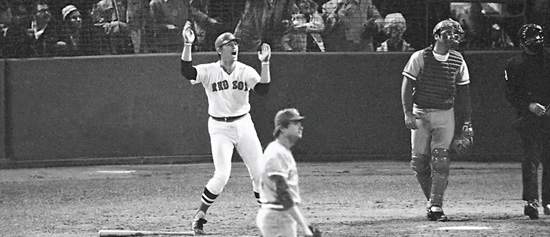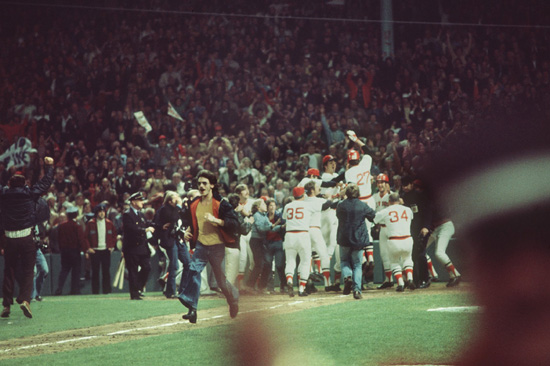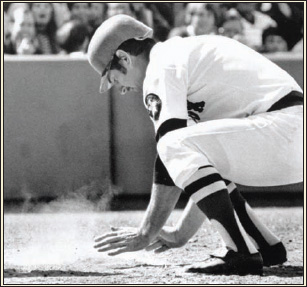Fenway Park (38 page)
Authors: John Powers

“Why? Why should the bond between a people and their baseball team be so intense? Fenway Park is a part of it, offering a physical continuum to the bond, not only because Papi can stand in the same batter’s box as Teddy Ballgame, but also because a son might sit in the same wooden-slat seat as his father.”
—Tom Verducci, sportswriter
But Yawkey, who’d been the club’s spiritual 26
th
player for four decades, was exuberant a year later as his club won the pennant for the first time since 1967 and went on to face the Reds in a World Series that featured the most dramatic game in postseason history.
Nobody would have predicted it after Boston had lolly-gagged its way through a listless spring training that prompted Yastrzemski to rip into his teammates in a closed-door meeting before the April 8 opener with the Brewers. “The worst attitude I ever saw,” the captain railed. “If it keeps up, we’ll finish in last place.”
That opener featured Hank Aaron making his American League debut after 21 years with the Braves, and Tony Conigliaro coming back as a designated hitter for the Sox after three-and-a-half years away from the game while his injured eye healed, Fenway was awash in emotion, especially when the once-favorite son singled in his first at-bat. “The ball looked like a basketball,” he said following his team’s 5-2 victory. “That’s what counts.”
While Conigliaro’s renaissance lasted only until June, the town soon was captivated by the Gold Dust twins, rookies Jim Rice and Fred Lynn, who had extraordinary debut seasons, with Lynn hitting .331 with 105 RBI and 21 home runs and Rice hitting .309 with 102 RBI and 22 homers.
With Tiant and Lee anchoring a pitching staff that received career seasons from Rick Wise (19-12) and Roger Moret (14-3), the club took over first place on May 24 after Lee, who’d mocked California’s flaccid lineup (“The Angels could take batting practice in the lobby of the Grand Hotel and not bother a chandelier.”), blanked them, 6-0, at Fenway. “He popped off and backed it up,” conceded Angels manager Dick Williams, whose players had taken batting practice in the Sheraton-Boston lobby that day using Wiffle bats and Nerf balls, until a hotel security guard halted the antics.
Boston soon proved that it was a genuine contender, winning nine straight at home to take a five-game lead following the All-Star break. For punctuation, Rice smashed a homer off the Royals’ Steve Busby that went over the center-field bleachers next to the Fenway flagpole. “I think the ball is on the New Hampshire toll road somewhere,” reckoned Busby. After taking beatings of 8-3 and 9-3, the visitors had seen enough. “Get me the hell out of here,” growled Royals Manager Jack McKeon.
But Boston’s biggest challenge was the Orioles, who’d won 10 of 12. When they came to Fenway for two pivotal games in mid-September, Tiant and Jim Palmer hooked up in a showdown for the ages. “Lou-eee, Lou-eee, Lou-eee,” the fans chanted as El Tiante befuddled Baltimore, 2-0, while Petrocelli and Fisk each rocked Palmer for homers. “We hurt them bad,” concluded Johnson, whose employers immediately invited fans to mail in applications for playoff tickets. “Sure, they can beat Oakland,” Palmer said. “Why not?”
While it was conceivable that Boston could win a post-season series against the Oakland A’s, who had won the three previous World Series (“Four In a Row?”
Sports Illustrated
mused in its pre-playoff cover story), nobody was predicting a sweep. But the Sox made the Athletics look like bushers in the Fenway opener as Tiant mesmerized them, conceding three hits across nine innings. “This is Lou-eee’s palace,” proclaimed Yastrzemski after Boston had punished the visitors with five runs in the seventh inning of a 7-1 rout. “In here, he can do no wrong.” And Oakland, which had won its division by seven games over Kansas City, could do no right, committing four errors, three of them on five batted balls in the first inning. “We embarrassed ourselves,” admitted A’s center fielder Billy North.
Even with Vida Blue, their 22-game winner on the mound, the A’s went down again the next day as Boston, sparked by Yastrzemski’s two-run homer in the fourth and Petrocelli’s leadoff shot off Rollie Fingers in the seventh, came from three runs down to win, 6-3, while the jubilant fans gave Oakland owner Charlie Finley a mocking farewell serenade: “So long, Charlie, we hate to see you go!”

THE
GREATEST GAME
EVER
It was 1975, Clark Booth recalled in a
Globe
story many years later, and the nightmare of Vietnam had just ended. The country was still shaking off Watergate. In Boston, court-ordered busing had turned neighborhoods into battlegrounds. These were not the best of times. Then along came the Reds, the Red Sox, and Game 6, and we discovered that baseball could still inspire us.
In 1975, the Red Sox came into their first World Series in eight years in a familiar position: although they were not the out-of-nowhere pennant winners of 1967, they were again facing a team that had dominated the National League. In 1967, it had been the 101-win Cardinals; this time, it was the 108-win Reds, and few people gave the Red Sox much of a chance against the “Big Red Machine.” They went down to defeat, but the Series went down as possibly the greatest ever played.
By the time Carlton Fisk was urging his dramatic 12
th
-inning home run fair in Game 6 on October 21, the Red Sox had made believers of much of the nation. And although Game 7 was decided on a ninth-inning looping single to center field, the Red Sox and Reds had compiled enough highlights to squarely put baseball back into the forefront of American sports fans’ collective consciousness, after it had languished behind football for several years.
“If this ain’t the national pastime, tell me what is,” Reds third baseman Pete Rose asked after Game 6. Rose would go on to be named the Series MVP.
Boston’s 7-6 victory in Game 6 was the first home night game in Red Sox postseason history, and it took four hours and almost 12 innings to complete. Each team seemed to have the game won at least once: the Reds were leading, 6-3, with two outs in the eighth before Bernie Carbo hit a dramatic three-run, pinch-hit homer; the Sox had the bases loaded and none out in the ninth inning of a 6-6 game, only to fail to score. The Reds seemed poised to take the lead in the 11
th
when, with a man on base, Joe Morgan laced a drive over Dwight Evans’s head in right field. Evans managed a leaping, lunging catch at the fence, and Boston finally prevailed an inning
later on Fisk’s blast off the left-field foul pole, which was officially christened the “Fisk Pole” 30 years later when the Reds visited Fenway Park in June 2005.
Roger Angell of the The New Yorker wrote: “What can we say of Game 6 without seeming to diminish it by recapitulation or dull it with detail?”
Fisk remembered telling Fred Lynn going into the 12
th
inning that he would hit one off the wall and that Lynn, whose earlier home run had given Boston a quick 3-0 lead, should drive him home. Instead, at 34 minutes past midnight, Fisk gave us one of the most oft-replayed clips in sports history, as he leaped, waved, and coaxed his drive off Reds pitcher Pat Darcy fair.
Fisk started down the line, carrying his bat the first few steps. He dropped the bat and started to yell at the ball, “Stay fair! Stay fair!” He never actually ran. He skipped sideways, watching the ball, and then began waving his arms from left to right. The dance was immortalized by a camera inside the left-field wall. (Legend holds that NBC got the shot because a rat scared the cameraman from his chair and the camera never moved, but the camera trails Fisk’s first few steps up the line.) The ball clanged off the foul pole high above the Green Monster, and Reds left fielder George Foster caught the winning home run on the fly as it ricocheted back toward the field. Ballpark organist John Kiley broke into the “Hallelujah Chorus” as Fisk tore around the bases, and in Fisk’s hometown of Charlestown, New Hampshire, David Conant—who had known Fisk since the catcher was a baby—rang the bells of the Episcopal church.
Foster kept the Fisk home-run ball at his mother’s house in California for the better part of the next 24 years. It sold at an auction in July 1999 for $113,273.
Despite being just 12 outs away from victory in Game 7 on October 22 (the Red Sox held a 3-0 lead as late as the sixth inning), Cincinnati’s Big Red Machine won the game and the World Series, both 4-3. The world championship drought in Boston would continue another 29 years.

CLEAN PLATE CLUB?
BY RAY FITZGERALD
May 25, 1975—Carl Yastrzemski, long known as a man of the soil, tried to show Lou DiMuro yesterday at Fenway Park how they plant potatoes on Long Island, but the umpire misread Carl’s intentions entirely.
DiMuro had just called Yaz out on a 3-2 pitch that the Red Sox captain judged to be somewhere in Jamaica Plain. Yaz, perhaps thinking that DiMuro should get into another line of business, proceeded to give the umpire a tip on truck farming.
Carl lovingly gathered some Fenway dirt in his hands and spread it over home plate to a depth of, oh, three inches.
He covered the middle and he covered the corners. He was nothing if not thorough.
Then Yaz flipped his batting helmet on the dirt, the way potato farmers always do back in East Hampton to protect their precious crop from grubs, cutworms and the common blight.
As a gracious afterthought, Yaz grabbed Rick Burleson’s dark glasses and tossed them in DiMuro’s general direction in case there should be a sudden eclipse of the sun.
DiMuro looked upon the heap of dirt not as a back-to-the-earth movement, but as a back-to-the-locker-room invitation.
And that’s where he consigned Capt. Yaz. He calmly uncovered home plate with his whisk broom and said, in effect: “To the clubhouse, Euell, and don’t forget your pail and shovel.”
So Yaz went, to join the already banished Bernie Carbo and Manager Darrell Johnson.

Two days later at the Coliseum, the Sox were spraying each other with champagne for the first time in eight years. “I don’t know if this stuff feels better when you drink it or have it poured over your head,” said Fisk after Boston had closed out the series with a 5-3 decision. Next up were the Reds, who would be playing in their third World Series in six years, but were looking for their first ring since 1940.
